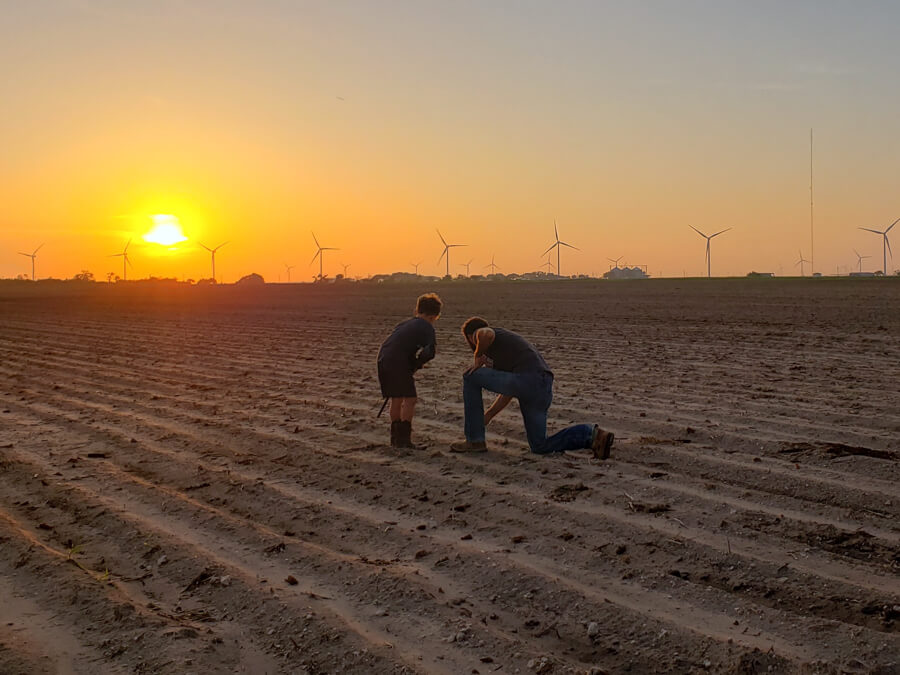May 23, 2023 | By: Sarah Franklin |Agribusiness, Cooperative

Women have been staples in farming, ranching, and running land operations for generations, especially in Texas. And today, women in agribusinesses and land investing are taking even more prominent roles.
As the number of women in ag continues to grow, there are plenty of opportunities — from starting a farm to investing in an agribusiness — but also some challenges to overcome. Here’s how women can continue making leaps into the agriculture industry.
Rising trends for female farmers
Every five years, the USDA conducts The Census of Agriculture, which looks at ownership, operations, productions, and land use of farms across the country. The latest AgCensus, from 2017, showed 26% of farmers are women, and 56% of farms have at least one female running high-level operations.
Those numbers show a rising growth of women in ag. Women are also heavily involved in decision-making, from day-to-day operations around crops and livestock to recordkeeping and financial management.
In 2002, the same survey showed the number of farms with principal women operators was just under 240,000. In 2017, the USDA changed classifications, making identifying women owners easier but more challenging to compare the numbers to past years. However, the data shows nearly 600,000 women across the country own their farms and are the primary producers.
Female farmers, operators, and producers play a prominent role in Texas — nearly 60% of Texas farms have female producers. And that growth has increased over the years across races; more farms are operating with female African-American, Latino, Asian, Native American, and Pacific Islanders producers in Texas compared to 20 years ago.
Since Texas is home to the highest number of farmers in the country, it’s important to continue to watch the trends. The growth of women in ag and agribusiness becoming more popular with other underrepresented groups helps encourage new generations of farmers to come to Texas, put down roots, and boost the local economy.
Overcoming common business challenges
While women’s participation in farming and other agribusinesses is rising, they still face challenges. Breaking into a traditionally male-dominated industry is often tricky; women-owned and operated farms typically have smaller acreage and lower farm sales and income than male farmers.
The good news is many within the industry are taking steps to prepare and inspire young women to explore the industry. For example, many colleges and universities with agricultural programs, such as Prairie View A&M University, offer programs and training specifically focused on providing women in ag with the tools they need to succeed. And Texas A&M’s AgriLife Extension Service has hosted regional events to educate female farmers.
Another challenge many women in the industry face is connecting with other farmers, investors, and agribusiness owners. Especially for those who may have inherited their farms or land from their fathers or husbands, it’s often difficult to know where to start. However, having a trusted group of women with similar expertise providing mentorship in the industry can go a long way toward boosting confidence and helping grow the business.
We’ve seen a number of conferences, non-profit organizations, and entrepreneurship groups in Texas focus on women in agriculture and farming. For instance, Dallas recently hosted the 2022 Women in Agribusiness Summit, providing women in the industry with education and networking opportunities. Other groups, such as the National Women in Agriculture Association (NWIAA), have chapters, events, and meet-ups throughout Texas to connect women for networking opportunities.
Growing opportunities for women in ag
Farming and ranching aren’t the only ways for women to get involved in agribusiness. Today, women are jumping into roles that wear many hats throughout the industry, including running independent agribusinesses such as crop consulting, dairy farms, and forestry operations.
Another growing area of opportunity for women in ag is the agtech space. Investors poured an estimated $5 billion into agtech businesses and startups in 2021, with these new and growing companies developing everything from precision farming technology to agrifood and supply chain improvements. Over the years, women founders have steadily increased in agtech, especially in agrifood development, presenting another path to get involved in agribusiness.
Land ownership and investing are other common paths for women to get into agriculture. In Texas, land is a precious resource, so it’s a prime destination for investors looking for land. Past growth with investments is no guarantee of future growth. However, Texas is a hotbed of high economic potential, making it a destination for new business. Plus, Texas has a variety of land attracting investors looking for ways to profit from rural land, including residential and commercial development, timber, and recreation opportunities.
Supporting every farmer
The USDA has a variety of programs aimed at historically underserved farmers and ranchers, including women, people of color, veterans, and those with limited resources. The Farm Credit System and lenders specializing in agricultural and land loans also have instituted programs such as the Young Beginner and Small (YBS) program.
The YBS Program helps those under 35 with less than ten years of experience in the industry who generate no more than $250,000 in gross ag sales annually. Applicants must only meet one of those criteria to qualify for the program. And the program aims to help get new farmers and ranchers up and running to help make up for the aging population.
Encouraging more people to explore a career in farming is increasingly important. The average farmer is nearly 58 years old, and those over 65 own approximately 40% of the farmland across the country. That means almost 370 million acres will change hands in the next 20 years as older farmers retire or pass on their farms to their loved ones.
So, having a new generation, especially women farmers, ranchers, and land owners, excited about stepping into those shoes is critical for the future growth of the industry and the economy here in Texas. Programs like the YBS Program help build a steady stream of new and diverse people into the industry.
Providing loans for women in ag
Part of running a successful agribusiness is taking advantage of new opportunities, expanding, and growing. But that often depends on getting the right financing. For example, a loan for ranch land improvement is far different than one needed to purchase new tractors and tillers, so it’s critical that lenders are there to provide help and guidance along the way.
Today, ag-focused lenders realize the opportunity for expanding access to farm loans for minorities and women means building up a new generation of farmers, ranchers, and agribusiness owners. When underrepresented communities, veterans, and women have access to resources, it helps make the entire farm community and industry stronger.
That means it’s critical to find and work with lenders that have specialized experience in agri-loans. There’s so much that goes into every facet of farming; having a lender that understands different needs and production cycles can make a big difference, especially for those newer to the industry.
Working with the experts
Whether you’re looking to break into agriculture, want to find opportunities to invest in rural land, or have plans to grow your agribusiness, Texas Farm Credit can help you get started.
With experience in ag and land loans, we have the expertise to help you navigate the decision-making process. And as a proud supporter of the YBS Program, we’ve worked with young farmers and ranchers to encourage and guide them as they get involved in the ag industry and grow their businesses.
Learn more about our ag loans, or get in touch with any questions.






